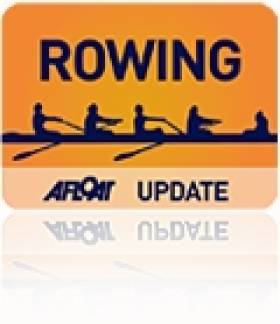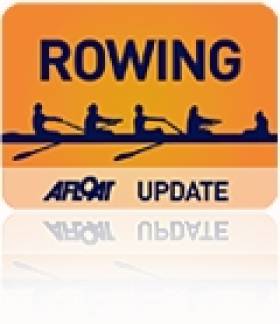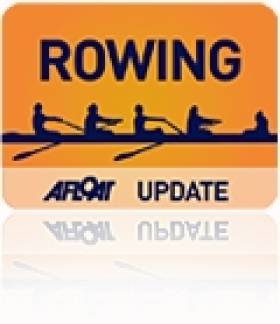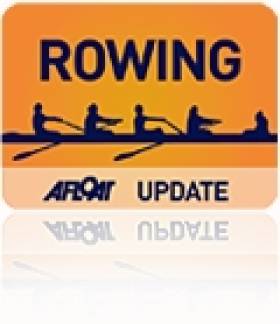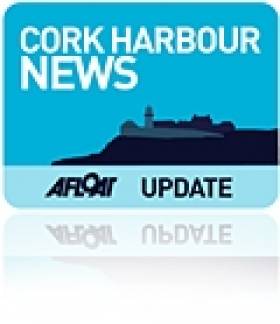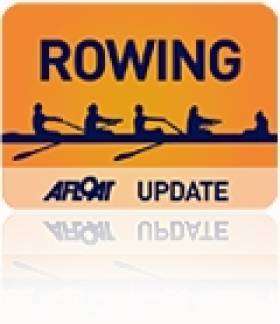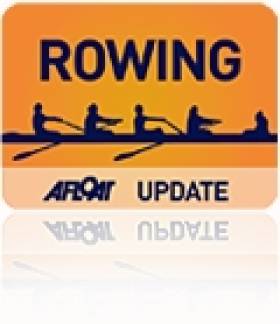Displaying items by tag: Cork Boat Club
Brand New Look For Cork Boat Club
#CorkBoatClub - Cork city's largest rowing club has unveiled its new look after 18 months of renovations, as the Evening Echo reports.
Thanks to grant funding under the Sports Capital Programme, the works have "transformed our club and ensured that Cork Boat Club’s landmark clubhouse at Undercliffe is now a modern and exciting structure", according to the club's Des O'Sullivan.
Along with a refurbished gym and a replaced clubhouse roof, the project also involved the restoration of the historic Blackrock Coastguard Station on the club's grounds.
The "iconic" 1840s building was preserved with the assistance of Cork City Council’s Conservation Department.
The Evening Echo has more on the story HERE.
#ROWING: Two of the big wins of the evening session of finals at the Irish Rowing Championships at the National Rowing Centre in Cork came to crews with very different levels of experience.
The Cork Boat Club junior women’s eight made a breakthrough for the club at this level by beating Portora and Bann in a fine race. The senior men’s quadruple was taken by the crew of Albert Maher, Sean Jacob, Con Collis and Michael Maher, who held off a challenge from the Castleconnell/University of Limerick crew. Jacob and Maher are both in their forties and have over 40 ‘Pots’ between them.
The women’s senior pair was won by Barbara O’Brien and Aifric Keogh, representing NUIG, while Sarah Quinn of Belfast Boat Club won the Club singles.
The junior men’s quadruple gave Shandon’s young crew – two are junior 17 athletes and one a junior 16 – a fine win over Skibbereen, who faltered before the finish.
The women’s lightweight single sculls final turned into a battle between Claire Lambe of Old Collegians and Siobhán McCrohan of Tribesmen, with the Dubliner coming out on top.
Turlough Hughes of UCD had a remarkably straightforward win over David O’Malley of St Michael’s in the men’s intermediate single sculls, while UCD held off a late charge by Queen’s to win the men’s novice eight.
Irish Rowing Championships, National Rowing Centre, Cork (Selected Results; Finals)
Men
Eight – Intermediate: 1 Trinity 5:46.25, 2 NUIG 5:50.28, 3 UCD 5:56.96. Novice: 1 UCD 6:59.50, 2 Queen’s 7:02.31, 3 Trinity 7:03.29.
Four, coxed – Junior: 1 Cork BC 6:35.99, 2 Presentation 6:36.22, 3 Portora 6:38.08.
Pair – Senior: 1 UCD (M O’Donovan, N Kenny) 6:46.05, 2 NUIG 6:49.95, 3 Commercial B 7:00.16.
Sculling, Quadruple – Senior: 1 Old Collegians/Commercial (C Collis, S Jacob, A Maher, M Maher) 5:59.84, 2 Castleconnell/University of Limerick 6:00.60, 3 Queen’s 6:07.90.
Junior: 1 Shandon 6:08.24, 2 Athlone 6:13.34, 3 Skibbereen 6:15.52.
Single – Intermediate: 1 UCD (T Hughes) 7:13.0, 2 St Michael’s (O’Malley) 7:20.72, 3 NUIG (O’Connor) 7:25.14. Club: Lee (D O’Sullivan) 7:31.80, 2 St Michael’s (P O’Connor) 7:36.24, 3 Belfast BC (A Murray) 7:39.44.
Women
Eight – Novice: 1 Queen’s 7:19.74, 2 Trinity 7:55.75. Junior: 1 Cork BC 6:39.32, 2 Portora 6:41.90, 3 Bann 6:45.27.
Sculling, Double – Intermediate: 1 Killorglin (F Foley, M Dukarska) 7:17.17, 2 Commercial 7:20.83, 3 Skibbereen 7:39.99.
Pair – Senior: 1 NUIG (B O’Brien, A Keogh) 7:33.89, 2 St Michael’s 7:42.32, 3 Shannon 7:42.48.
Single – Lightweight: 1 Old Collegians (C Lambe) 7:41.70, 2 Tribesmen (McCrohan) 7:43.80, 3 Skibbereen (Hayes) 8:01.34. Club: 1 Belfast (S Quinn) 8:09.22, 2 Queen’s (Edwards) 8:10.61, 3 Lee (McGuire) 8:39.69.
Junior: 1 Cork BC (O Forde) 8:06.14, 2 Belfast BC (J English) 8:07.11, 3 Commercial B 7:00.16.
#ROWING: The men’s junior coxed four was the standout race of the morning session at the Irish Rowing Championships at the National Rowing Centre in Cork today. It took a photo finish to confirm Cork Boat Club’s win over Presentation, with Portora also disputing the lead right to the last 50 metres.
Cork Boat Club also took the women’s junior single sculls title through Oisin Forde, who won a fine battle with Jasmine English of Belfast Boat Club. Forde is from Torrevieja in Spain and with her sister Dervla, who was third, will represent Ireland at the Coupe de la Jeunesse next month.
The men’s senior pair final gave Mark O’Donovan and Niall Kenny of UCD a chance to show why they are in the frame to represent Ireland at the World Championships this year, while a former international Fiola Foley partnered a current one, Monika Dukarska to win the women’s intermediate doubles title.
Irish Rowing Championships, National Rowing Centre, Cork (Selected Results; Finals)
Men
Eight – Intermediate: 1 Trinity 5:46.25, 2 NUIG 5:50.28, 3 UCD 5:56.96.
Four, coxed – Junior: 1 Cork BC 6:35.99, 2 Presentation 6:36.22, 3 Portora 6:38.08.
Pair – Senior: 1 UCD (M O’Donovan, N Kenny) 6:46.05, 2 NUIG 6:49.95, 3 Commercial B 7:00.16.
Sculling
Single: Lee (D O’Sullivan) 7:31.80, 2 St Michael’s (P O’Connor) 7:36.24, 3 Belfast BC (A Murray) 7:39.44.
Women
Eight – Novice: 1 Queen’s 7:19.74, 2 Trinity 7:55.75.
Sculling, Double – Intermediate: 1 Killorglin (F Foley, M Dukarska) 7:17.17, 2 Commercial 7:20.83, 3 Skibbereen 7:39.99.
Single – Junior: 1 Cork BC (O Forde) 8:06.14, 2 Belfast BC (J English) 8:07.11, 3 Commercial B 7:00.16.
O'Malley Takes Junior Title at Irish Rowing Championships
ROWING: David O’Malley won the junior single sculls title at the Irish Rowing Championships at the National Rowing Centre today. The St Michael’s man carved out an early lead over last year’s champion Conor Carmoday of Shannon and stretched it to two and a half lengths by half way. Carmody, under pressure himself from Waterford’s Andrew Goff, cut the lead in the closing stages, but O’Malley held on.
The men’s senior doubles was won impressively by Gary O’Donovan and Shane O’Donovan of Skibbereen from Eimantas Grigalius and Dave Neale of Three Castles, while NUIG/Cork won the women’s senior four. The women’s junior doubles was won by Oisin and Dervla Forde, who live in Torrevieja in Spain, but were campaigning for Cork Boat Club.
Irish Rowing Championships, National Rowing Centre, Cork (Selected Results, Finals)
Men
Four, coxed – Intermediate: 1 NUIG 6:26.37, 2 Carlow 6:29.33, 3 Neptune 6:36.71.
Sculling, Quadruple – Novice, coxed: 1 Queen’s 6:49.52, 2 Clonmel 7:01.83, 3 Kenmare 7:17.56.
Double – Senior: 1 Skibbereen 6:30.22, 2 Three Castles 6:34.96, 3 UCC 6:45.32.
Single – Junior: 1 St Michael’s (D O’Malley), 2 Shannon (C Carmody), 3 Waterford (A Goff).
Women
Four – Senior: 1 NUIG/Cork 6:57.92, 2 Trinity 7:09.18, 3 Skibbereen 7:16.93.
Four, coxed – Club: 1 NUIG A 7:25.50, 2 UCC 7:33.87, 3 Skibbereen 7:38.30.
Pair – Intermediate: 1 St Michael’s 7:49.72, 2 Trinity 7:53.27, 3 Shannon 7:53.29.
Sculling
Double – Junior: 1 Cork 7:26.87, 2 Belfast 7:32.25, 3 Commercial 7:36.33.
Hennessy and O'Neill Top Cork Sculling Ladder
#ROWING: Colm Hennessy of Shandon Boat Club and Marie O’Neill of Cork Boat Club were the overall winners of the Cork Sculling Ladder for 2013-2014. O’Neill retained the title she had won in 2013. The presentation for all the winners of the Ladder will be made this evening by Judge Donagh McDonagh at Cork Constitution club at Temple Hill.
Cork Boat Club Signs MOU with Cork's Emergency Services
#corkharbour – Recognising the need for adequate and safe launching facilities in the upper river area for agencies responding to emergencies and river searches, a jointly funded project by Port of Cork and Cork City Council ensuring Cork Boat Club's eastern slipway is operational and fit for purpose, has been completed. As a result of this project and to ensure continual sharing of the facilities, a memorandum of understanding (MOU) between Cork Boat Club, Port of Cork, Cork City Fire Brigade and Cork City Civil Defence was signed today.
Cork Boat Club has for many years allowed the Emergency Services access to its grounds and slipway. Sharing of access to the sole operational slip at times however, caused congestion between Cork Boat Club's day-to-day launch, recovery operations and the needs of the local Emergency Service. Cork Boat Club agreed to provide 24/7 access to the Emergency Services and Port of Cork, and any other agencies under their control, when responding to an emergency situation or conducting training, while Port of Cork and Cork City Council agreed to jointly fund the repair of Cork Boat Club's second slipway to ease launching congestion at peak times.
According to the Port of Cork Harbour Master, Captain Paul O'Regan, this MOU is a positive step for all parties involved.
He said: "We were very pleased to be a part of the project, which demonstrates the close working relationship between the City Council and the Port Company. The MOU agreed between the parties will provide a valuable resource for all involved. Cork Boat Club already facilitates boat storage for Blackrock Coastal Rowing Club and this agreement is a further example of their community focus"
Captain O 'Regan continued: "This arrangement will operate on a goodwill basis for the benefit of the community at large and will greatly assist the emergency services, which are very often faced with challenging search and recovery tasks."
Cork Boat Club Chairman John McCarthy added: "This arrangement is in line with our deeply held community based ethos and is a win-win for all parties. Cork Boat Club has had tremendous success both on and off the water in recent years, and this is another significant step in the right direction."
On behalf of Cork City Fire Brigade, the MOU was welcomed by Chief Fire Officer, Mr John Ryan.
All parties in this Memorandum of Understanding will meet formally on an annual basis to review its operation and to ensure that any associated issues are managed.
Cork Boat Club in Blackrock Village was established in 1899 and has 200 members. In 2013 it had the distinction of having fourteen of its rowers selected to represent Ireland at International level, the highest level of international representation of any club in the country.
Cork Boat Club Mark Good Year on International Front
#CorkRowing: Fourteen Cork Boat Club rowers represented Ireland at international level in 2013, and the club marked the feat with a function recently. The club, based in Blackrock, had nine members who rowed at the Home International Regatta, four at the Coupe de la Jeunesse, a European junior tournament, and one, Leonie Hamel, at the World Junior Championships.
Cork Head a Happy Hunting Ground for Local Crews
# ROWING: Cork Boat Club had a string of wins at the Cork Head of the River at the Marina on Saturday. Their senior eight were the fastest crew of the day. John Keohane of Lee Valley was the top single sculler.
Cork Head of the River, Saturday (Selected Results)
Men
Eight – Senior (Head One): 1 Cork BC 12:44.6, 2 Putney Town 13:57.1. Inter One (Rolling hd): Muckross 14:28.3. Novice (Hd 1): UCC 13:36.3. Junior 18A (Hd 1): Presentation 13:26.4. Jun 16 (Hd 1): 14:46.7. Masters (Hd 6) Putney Town 15:22.7
Fours – Inter, coxed: Fossa 15:44.3. Novice, coxed: UCC 15:56. 2. Junior 18A (Hd 3): Presentation 15:33.1. Masters, coxed (Hd 6) Shandon 17:45.4.
Sculling, Quadruple – Senior (Hd 4): Cork BC 16:08.4. Jun 18A (Hd 4): Lee 14:29.2. Jun 16, coxed (Hd 4): Clonmel 15:50.5. Masters, coxed (Rolling Hd) 16:45.6.
Double – Senior (Hd 6): UCC 15:15.1. Inter One (Hd 6) 14:43.1. Novice (Hd 6): Cappoquin 15:47.7. Jun 18A (Hd 6) Shandon 14:30.5. Jun 16 (Hd 6) Killorglin 18:11.0. Single – Senior (Hd 2): Lee Valley (J Keohane) 15:19.6. Intermediate: UCC (McGuckin) 16:13.4. Novice (Hd 2): UCC (Stanton) 16:35.8. Junior 18A: Shandon (Harrington) 15:32.8. Junior 16 (Hd 2) Castleconnell (Whittle) 16:43.0. Masters (Rolling Hd) Shandon (Smith) 19:04.7.
Women
Eight – Intermediate One (Hd 4): Cork BC 16:56.4. Novice (Hd 4): UCC 18:21.9. Jun 18A (Hd 4): Shannon 16:58.1. Jun 16 (Hd 4) Shannon 17:38.7.
Four – Senior (Hd 6) Cork BC 15:09.9. Inter, coxed (Hd 6): Cork BC 17:13.8. Novice, coxed (Hd 6) UCC 27.17.4. Jun 18A (Hd 6): Shannon 16:26.1.
Pair – Senior: Cork BC 18:02.7. Junior 18A: Shandon 18:383.
Sculling, Quadruple – Junior 18A (Hd 1): Cork BC 14:45. Novice, coxed (Hd 1): Cork BC 16:04.7. Jun 16, coxed: Killorglin 16:44.7.
Double – Intermediate One (Rolling Hd): Cork BC 16:46.4. (Hd Three): UCC 18:33.8. Novice (Hd 3): Skibbereen 19:25.7. Jun 18A (Hd 3): Cork BC 18:06.0. Jun 16 (Hd 3): 19:05.7.
Single – Jun 18 A (Rolling Hd): Muckross (Hickey) 20:39.5.


























